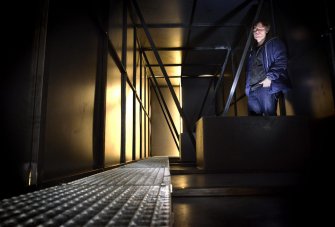Andreas Golinski
Andreas Golinski (Essen) è un artista tedesco che vive e lavora in Italia, recentemente impostosi sulla scena nazionale. La ricerca di Golinski propone una riflessione sui modelli coercitivi di convivenza e di lavoro imposti dall'economia postindustriale e globalizzata, e, più in generale, sulla consapevolezza dell'individuo rispetto ai processi storici di cui è partecipe. Le sue installazioni, che si distinguono per un trattamento accurato ed evocativo della luce e del suono in particolare, sottopongono lo spettatore a esperienze percettive stranianti: percorsi obbligati e talvolta fuorvianti, drammatiche sequenze illuminate che fendono l'oscurità rivelando geometrie inattese e monumentali sbarramenti realizzati assemblando strumenti da acciaieria, cui forse non sono estranee le radici geografico-culturali dell’artista, proveniente da Essen, nell'area industriale del bacino della Ruhr. Il forte impatto espressivo delle opere di Golinski si deve anche al contrasto tra l'aspetto vuoto e artificiale degli spazi a cui dà forma ed i sottili rimandi alla presenza umana che può averli abitati, spesso enfatizzati da espliciti riferimenti al contesto storico-locale.
Andreas Golinski is a German artist from the Ruhr, a region scarred by the post-industrial crisis, he metabolizes raw materials, wood, pallets, steel girders, industrial rejects, and for this reason he is often regarded as an heir to the conceptual research of Arte Povera. Yet the results are the opposite, anti-conceptual and anti-abstract: Golinski’s works do not engineer short-circuits between materials and thought but quiver with presentiment, with menace. A black wall, a blind window, the stump of a girder, a sheet of paper choked with black oil paint: the viewer immediately senses a hidden story. Sculptures and paintings, like black boxes, solidify the imminence of an encounter with tragedy. His installations are coagulations of the infinite instant that precedes a secret, narrative spaces that, independently, under the impetus of an unspoken tale, split, shatter and strangle themselves in blind alleys, congeal, or tear in sources of light. And, at times, it is the viewers themselves who are lowered into the dark belly of this foreseen tragedy, to experience it from the inside. Andreas, keeping them in the dark, aims to involve them emotionally. He wants them with him and with his phantoms, with his painful secrets. His is, right from the outset, a political operation, that of a politics without names: in the depths throb accounts, echoes, memories, some of them autobiographical, of lands where anonymous automatisms imprison the individual, stripping him of his identity. Pouring them into vivid, absolute metaphor, that of black, untitled moulds, Golinski extracts from them pure forms of an irremediable split, icons of resistance of the faceless individual.

